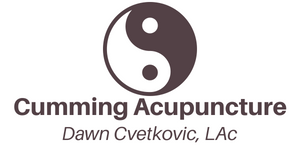What is Acupuncture?
Acupuncture is the gentle insertion of very fine stainless steel needles into specific points on the body. This stimulates the movement of energy within the body (called Qi, pronounced Chi) promoting natural healing which increases immunity, supports emotional and physical health and well-being.
Acupuncture is an important component of Traditional Chinese medicine (TCM) which is used in the treatment and prevention of disease. It is a form of health care that has evolved over the past 3000 years into a complete and “Holistic” medical system. TCM incorporates health concerns pertaining to Body, Mind and Spirit.
When most people think about acupuncture, they are aware of its use for pain management and control. However, acupuncture has a proven track record of treating a variety of circulatory, endocrine and systemic conditions.
How does Acupuncture Work?
The essence of Traditional Chinese Medicine is the philosophy that Qi or vital energy, flows throughout the body. Qi protects the body from pain, illness and disease. A person’s health is based on the quantity and quality of their Qi.
There are 14 main meridians that Qi flows throughout the body. Each meridian is connected to a specific organ or gland. Meridians are like rivers. An obstruction of Qi is like a dam. Qi becomes blocked and energy flow to parts of the body becomes restricted. Blockage of Qi can result in pain, disease and death.
Meridians are often compared to as a series of interconnected highways or waterways. They flow throughout the body transporting vital nutrients to nourish and energize every cell, gland, organ, tissue and muscle.
The Chinese believe that health is a manifestation of balance, both within the body itself and between the external environment. If an obstruction occurs in one of the meridians, the Qi is disrupted and cannot flow properly. When the Qi cannot flow smoothly or is forced to flow in the opposite direction, the body’s innate balance is disrupted and illness results.
Acupuncture points are the specific points on the meridians where the Qi is both concentrated and accessible. Needles engage the Qi when they are inserted into specific points. The goal being, restore the proper flow of Qi and regain overall function and well being.
Do the needles hurt?
For the most part people do not feel pain at all. But some feel a little pain as the needles are inserted. If the pain persists then the needle is in the wrong place, either brushing against a nerve or blood vessel. If this happens, let me know and I will take it out immediately. The needles are very thin, just a little larger than a human hair. It’s very important to me that you feel at ease and are comfortable with no pain from the needles.
Why do you want to feel my pulses?
There are 12 pulse positions on each wrist that I will palpate. Each position corresponds to a specific meridian and organ. Feeling the pulse helps me find or confirm problems.
Why do you want to look at my tongue?
The tongue is a map of the body. It reflects the general health of the organs. I’ll be looking for the shape, color, cracks and coat on your tongue.
Acupuncture and Modern Science
In 1997 the National Institute of Health (NIH) Consensus on Acupuncture reports that “studies have demonstrated that acupuncture can cause multiple biological responses, mediated mainly by sensory neurons, to many structures within the central nervous system”.
- Neurotransmitter Theory – Acupuncture affects higher brain areas, stimulating the secretion of beta-endorphins and enkephalins in the brain and spinal cord.
- Autonomic Nervous System Theory – Acupuncture stimulates the release of nor epinephrine, acetylcholine and several types of opioids, affecting changes in their turnover rate and normalizing the autonomic nervous system, and reducing pain.
- Vascular-interstitial Theory – Acupuncture manipulates the electrical system of the body by creating or enhancing closed circuit transport in tissues. This facilitates healing by allowing the transfer of material and electrical energy between normal and injured tissue.
- Blood Chemistry Theory – Acupuncture affects the blood concentrations of triglycerides, cholesterol, and phospholipids, suggesting that acupuncture can both raise and diminish peripheral blood components, thereby regulating the body toward homeostasis.
To the human body, acupuncture needles are a physical stimulus. In Western Science, a stimulus is defined as a detectable change in either the external environment or within the body itself. When the body detects change, it produces a response. Although acupuncture is not yet fully understood by Western science, with modern technology scientists can now actually begin to “see” the body’s response to acupuncture. For example, using an MRI (Magnetic Resonance Imaging), researchers have shown that when a needle is inserted at specific acupuncture points on the body, corresponding changes occur in the brain.
What type of education do Acupuncturists get?
There are different types of Acupuncturists;
- Have a 4 year Bachelors Degree, then attend a Traditional Chinese Medicinal school for 3 to 4 years of extensive ( 5 to 6 days a week) graduate training at a nationally certified school. These Acupuncturists are trained in Acupuncture and Chinese herbs.
- Some have 2 years college and then attend an acupuncture school without herbal training for 2 years on the weekends.
All Acupuncturists must pass state and national exams and follow strict guidelines in order to practice.
Is Acupuncture safe for children?
Absolutely! In most cases children respond more quickly to acupuncture than adults. If your child does not like needles, other non threatening methods of acupressure can be used to access the acupuncture points. I have done it on both of my children since they were 2 months old.
How safe is Acupuncture?
Acupuncture is extremely safe. It is a drug free, all natural therapy, with no side effects… except a feeling of well being and relaxation! Infection is highly uncommon because the needles are sterile, used once and then carefully disposed of.
